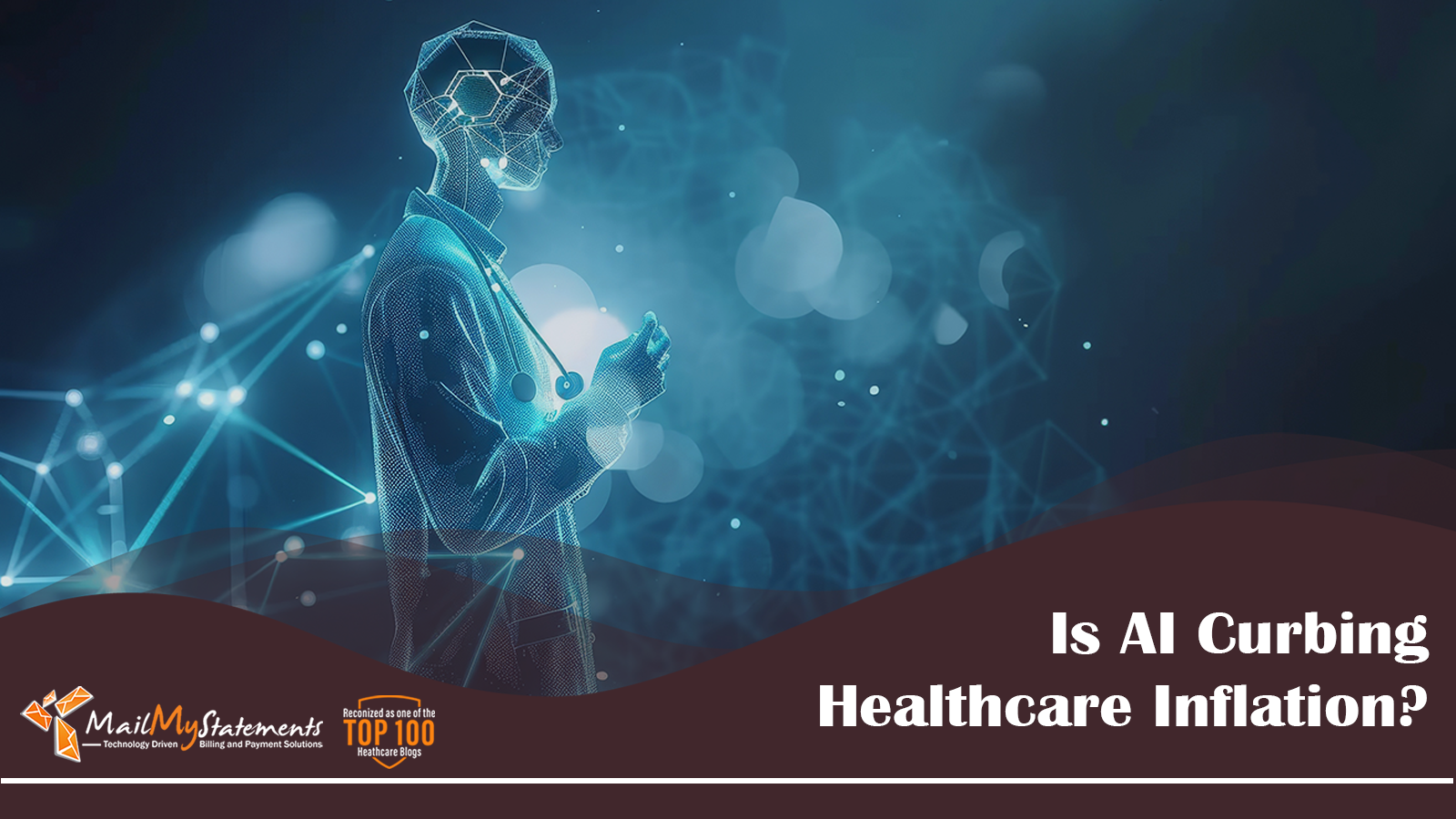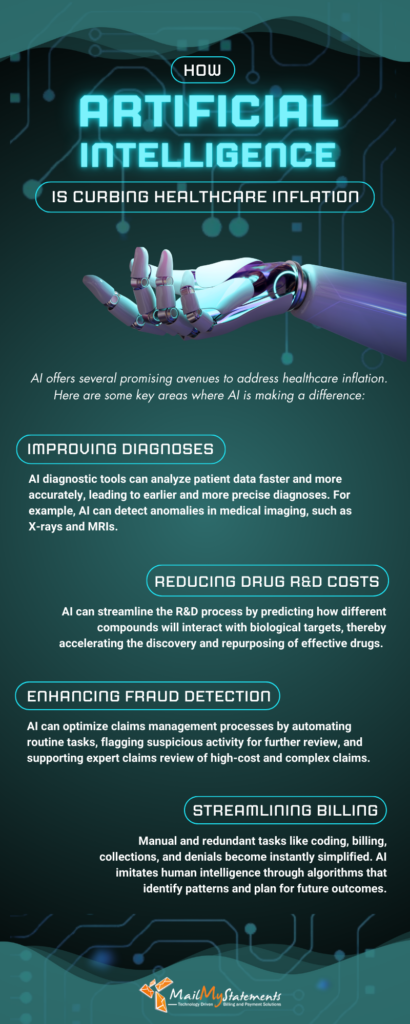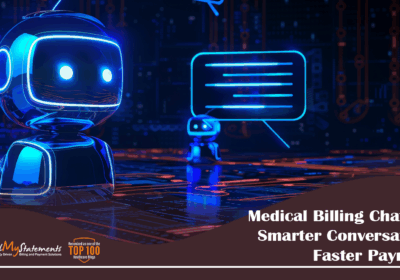Is AI Curbing Healthcare Inflation?

Artificial intelligence (AI) has revolutionized many sectors of the economy already, but with healthcare, the stakes are higher. When people’s health—and even their lives—are on the line, it’s easy to see why the rollout of AI has been a bit more conservative in our industry.
Still, AI is already at work in healthcare, and as AI technologies continue to evolve, their applications promise groundbreaking advances in diagnostics, treatment, and the everyday operations of healthcare providers. Will this help curb the ever-increasing costs of care, offsetting inflation? In this blog post, we’ll explore AI’s impact on healthcare expenses.
Understanding Healthcare Inflation
Healthcare inflation refers to the ongoing rise in healthcare costs over time. The inflation rate in healthcare outpaces the inflation rate of the economy as a whole—while consumer goods and services have an 85% inflation rate since 2000, healthcare expenses have increased a staggering 119% during the same period.
Several factors contribute to this phenomenon, including:
- Healthcare advancements: While new healthcare technologies, services, and drugs can improve patient outcomes, they also often come with a hefty price tag. Biologics, for example, are much more expensive than typical small-molecule drugs.
- Aging population: An older population requires more medical care, leading to cost increases due to supply and demand.
- Chronic diseases: JAMA points to an increase of chronic diseases, and specifically diabetes, as a factor in rising healthcare costs. These conditions require ongoing treatment, and many newer therapies and specialty drugs have high price tags.
- Administrative costs: Complex billing systems, insurance, and administrative processes also add to the overall cost of care.
The rising cost of healthcare doesn’t just impact patients. Providers feel pressure to cut expenses, insurance companies receive higher claims and raise premiums in response, and the government also must grapple with affording more expensive care for its Medicare and Medicaid subscribers.

The Potential Role of AI in Curbing Healthcare Inflation
AI offers several promising avenues to address healthcare inflation. Here are some key areas where AI is making a difference:
Improving Diagnoses and Treatments
AI-powered diagnostic tools are able to analyze patient medical data faster and more accurately than traditional methods, which can lead to earlier and more precise diagnoses. For example, AI algorithms can detect anomalies in medical imaging, such as X-rays and MRIs, with a high degree of accuracy. A study in the journal Healthcare points to this type of AI use as providing a “tremendous” cost savings in both diagnosis and treatment.
Reducing Drug R&D Costs
Drug research and development (R&D) has traditionally been a time-consuming and expensive endeavor, averaging over $2 billion. This is being disrupted by AI, which can streamline the process by predicting how different compounds will interact with biological targets, thereby accelerating the discovery and repurposing of effective drugs. In a recent White House briefing, the National Economic Advisor, Domestic Policy Advisor, and the Director of the Office of Science and Technology Policy point to drug development as an example of how AI can be used to improve healthcare costs.
Enhancing Claims Management and Fraud Detection
AI can optimize claims management processes by automating routine tasks, flagging suspicious activity for further review, and supporting expert claims review of high-cost and complex claims. AI algorithms can detect inaccuracies and inconsistencies more efficiently than humans. Therefore, AI plays a valuable role in spotting billing errors and fraud, as well as opportunities for improved patient care and coordination. Research from Health Payer Intelligence highlights the role of AI in managing high-cost claims, with the caveat that there remains a need for human oversight to ensure accuracy and fairness.
Streamlining Billing
To build on the previous point, AI is being used in a number of ways to improve the patient billing process. Learn more in our articles on AI Medical Billing: How to Transform Patient Collections, How to Use ChatGPT in Revenue Cycle Management, and How Artificial Intelligence Enhances Patient Billing.
Benefits and Challenges of AI Integration
As mentioned above, the rollout of AI in the medical sciences and healthcare has taken more of a dip-your-toes-in-the-water approach than sectors like tech, which took the plunge immediately. This is because the advantages must be carefully weighed with the potential challenges within a strict regulatory environment.
Benefits
For healthcare professionals, billers, and practice managers, AI offers several advantages:
- Efficiency. Automation of routine tasks frees up time for healthcare providers to focus on patient care and higher-level tasks.
- Cost savings. Reduced diagnostic errors, streamlined administrative processes, and lower R&D costs all contribute to overall cost savings.
- Improved patient outcomes. Accurate diagnoses and personalized treatment plans mean better patient care and higher satisfaction.
Challenges and Concerns
Despite its potential, integrating AI into healthcare is not without challenges:
- Data privacy. Ensuring the security and privacy of patient data is paramount, and there are questions as to how this can be accomplished with AI.
- Bias and fairness. AI algorithms must be trained on diverse datasets to avoid biases that could lead to disparities in care.
- Regulatory compliance. Navigating the regulatory landscape to ensure AI tools meet legal and ethical standards can be complex.
- Skilled workforce. As a new technology, the number of people who can implement AI in healthcare is limited. Training healthcare professionals to effectively use AI tools is essential for successful integration.
Will AI Help Offset Rising Healthcare Costs?
AI is already curbing some healthcare costs, and as the technology continues to advance, its role in reducing healthcare costs is likely to expand. Improving diagnostic accuracy, reducing drug development costs, and streamlining administrative processes are all ways that AI can reduce expenses for providers and, in turn, reduce expenses for patients.
While challenges remain, the benefits for healthcare professionals, medical billers, and practice managers are substantial. If you’re interested in learning how MailMyStatements uses AI to streamline the billing process, get in touch.
![]()



